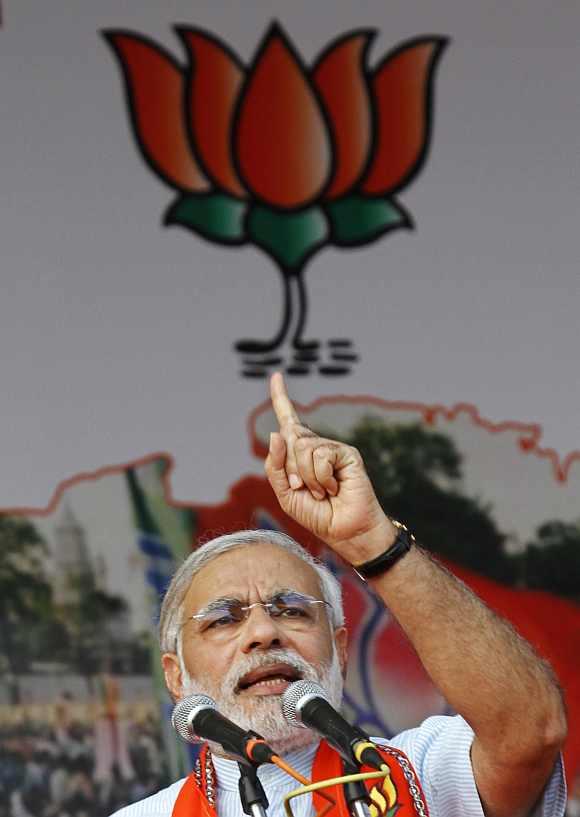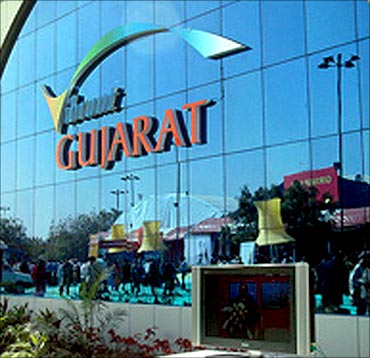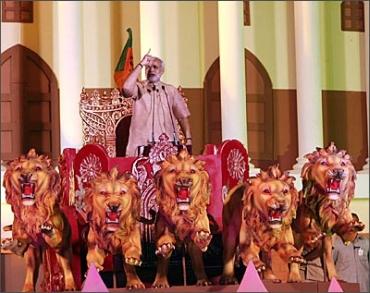 | « Back to article | Print this article |
Social contract: Why Modi scares the usual suspects
Rajeev Srinivasan on why Narendra Modi is a threat to the establishment because he overturns many of the convenient myths they propagate.
It is a predictable winter ritual: Around this time every year it gets into high gear. A bit like Super Bowl season or duck-hunting season: The season to invent, regurgitate and shed crocodile tears over stories about how wicked Narendra Modi is.
There are quite possibly three reasons why there is such widespread and venomous criticism of Modi, apart from the obvious political fact that he has become a viable candidate for national office. Any one of these is good enough reason for Modi-bashing; but given all of them simultaneously, no wonder his detractors are practically apoplectic.
The three reasons, in my opinion, are:
- Modi has created a social contract with the people of Gujarat, which seems to work; it has broader national implications as well;
- Modi has tamed the corruption monster, by not taking bribes himself, but more importantly, preventing others from doing so;
- Modi has shown total contempt for political shysters and media hucksters: this hurts their amour-propre; not to mention their pocket-books
Modi's greatest achievement has been the fact that he has created a clear social contract with the people of his state. (I am indebted to my friend B Rao of Los Angeles for this insight). Modi promised them development, and he delivered. In return, he asked for just one thing: Discipline and the people delivered. This has become a win-win situation for both parties, and for investors: There is a visible change in Gujarat's fortunes, right on the ground.
The state GDP growth rate of Gujarat in the recent past has been at a scorching pace of 11.3 percent in 2005 (Glimpses of Gujarat's high growth story), considerably greater than that of India as a whole. This does not, alas, satisfy carping critics.
Please click NEXT to read further...
'Modi has delivered on his social contract: growth in return for order'
There was a long essay in Caravan magazine: I glanced through it, and one of the points made was that, even though $920 billion in investment had been promised for Gujarat during the last few 'Vibrant Gujarat' meets, only about 25 percent of these have materialised.
That, however, is the norm in India: No more than about 25 percent of the promised investment actually materialises.
But look at the sheer numbers: Almost a trillion dollars in investment proposals, and actual investment of, say, $230 billion! That is astonishing.
This number can be directly contrasted with another large number: $462 billion. That is the amount estimated by Global Financial Integrity as the total amount siphoned out of India through illegal financial flows between 1948 and 2008.
In an intriguing irony, 'Vibrant Gujarat 2011' saw MoUs for $462 billion being signed -- precisely the same as the amount estimated by Global Financial Integrity as having been spirited away in 60 years of allegedly Socialist rule at the Centre!
Modi has delivered on his implicit social contract: growth in return for order. When you think of social contracts, there are several models to consider, for instance those attributed to Europeans such as Locke, Rousseau and Hobbes, medieval imperialist models, Indian models, and the Confucian 'Iron Rice Bowl.'
A common thread among all these models is that there is a tradeoff: There are rights, and there are responsibilities. It is necessary that you give away some of your rights in the interest of the greater good of society. The models differ in details, as well as in perspective -- for instance, is it teleological/utilitarian, preferring the greatest good for the greatest number, or is it deontological, preferring to protect the rights of the very weakest members?
In some cases, it is neither, and is meant to be purely exploitative.
It could be argued that Modi has revived a traditional Hindu/Buddhist social contract, which, in return for discipline and hard work, provides the populace with security and righteous order.
The population may pursue dharma, artha, kama, or moksha, without interference from the State; but they pay taxes and do their civic duty, and the State guarantees protection from predatory outsiders. This is roughly in line with the American idea of the rights to 'life, liberty and the pursuit of happiness.'
This general Indian principle also evolved into the idea of gentlemanly warfare, wherein non-combatants were spared, with only the Kshatriya class involved in bloodshed, battles ended at nightfall, and winners were chivalrous to fallen foes.
This sort of contract is explicit in Emperor Ashoka's reign, and most vividly in Chanakya's Arthashastra. Chanakya laid out in detail the kinds of information-gathering and management control that a sovereign needs to institutionalise, and contrary to popular mythology, Ashoka employed thousands of spies to ensure that any unrest was nipped in the bud and malcontents isolated.
Please click NEXT to read further...
'Indians have barely survived the Hobbesian model'
This model was what turned India into the most prosperous nation in the world, as detailed in Angus Maddison's magisterial economic history of the world. It was in fact the world's leading economic power till roughly 1700 CE.
This model worked for several thousand years, from the earliest known stages of the Indus-Saraswati civilisation roughly 5,000 years, up until the arrival of Arab and Turkish hordes in the 1100 CE timeframe, and later, the European hordes circa 1700 CE. This dharma or 'natural order' in Locke's terms has been forgotten by modern Indians, brought up on a steady diet of misinformation.
The models that today's Indians are more familiar with are Hobbesian, leading to 'nasty, brutish and short' lives -- those of empire. We have endured three forms of this imperial model: Muslim, Christian, and Communist. And we have barely survived.
The Arab/Turkish Muslim social contract of dhimmitude imposes order by explicitly reducing the rights of certain groups (non-Muslims) while allowing them the minimum possible subsistence to exploit them as productive members of society. However, in India, this was an unstable equilibrium because the Hindus resisted, and resisted continuously, unlike non-Muslims in, say, Iraq, Egypt or Persia.
The European Christian social contract of colonialism imposes order by explicitly pursuing a policy of overseas theft and loot, based on the superiority of 'guns, germs and steel.'
Interestingly, this social contract is now unraveling, as there are no more subject peoples to loot and steal from: Europe is collapsing into oblivion.
An excellent interview in The Wall Street Journal on February 26 with historian Norman Davies suggests that the end is nigh for Europe. Why? Its social contract with its citizens has been that they would get prosperity in return for providing the muscle for overseas expeditions. Bereft of empire and forced to fall back on their own (minimal) resources, countries like the UK are rapidly reverting to their natural, Hobbesian state: The riots in several cities last year are indicative of this.
The Communist social contract is a form of fascism and Stalinism. It demands absolute loyalty from the public in return for... well, promises, but not often the reality, of prosperity. There is the stinging criticism that Communism offers you a version of democracy: 'One man, one vote, one time.' That's it. One time.
The incarnations of this contract range from the brutal gulags of the Soviet Union, China and Cambodia to the more mellow socialism in India. But that last, even though less violent in visible ways, has been an economic crime against humanity: It prevented 400 million Indians from climbing out of poverty.
Please click NEXT to read further...
'Modi has been able to fix corruption with a singular mantra'
After 60 years of it, Manmohan Singh called hunger in India a 'national shame'. It is indeed a shame, and it indicates the utter failure of the Communist/socialist social contract.
This is why the powers-that-be fear Modi's obviously successful social contract: Much as they try to paint Modi as hell-bent on victimising Muslims, the latter have voted with their feet. They are willing to stay in Gujarat, eschew violence, and prosper. The Hindus are doing exactly the same thing: they have stayed, eschewed violence, and prospered.
Precisely: A real secular state, where you succeed not based on your religion, but on how hard you work.
So clearly there is an alternative to the orthodox Stalinism of the powers-that-be, one that works. How terrible it will be if the rest of the country took notice! Whatever will the purveyors of failed social contracts do? That is reason number one Modi is bad.
Reason number two is related. Endemic corruption, and lack of leadership, are the biggest problems India faces. There are many leaders who are supposedly personally honest, but who allow those around them to indulge in the mass loot of the public treasury. Is that any better than if they were themselves indulging in theft? Probably not: It just adds hypocrisy to their other crimes.
Modi has been able to fix corruption with a singular mantra: Not only is he personally not on the take but he doesn't have offspring on the take either (Bhishma-like, eh?). But what's more, he doesn't allow anybody else to be corrupt either. This is most distressing for the neta-babu crowd.
The fishes and loaves of office are turning into ashes in their salivating mouths: So what is the point in spending big bucks to get a rentier job or an MLA seat unless your rent-seeking self can recoup the investment in a matter of months? None whatsoever, and that is precisely the point!
It is amusing to note that Modi is immensely popular everywhere in Gujarat, except in the capital Gandhinagar -- his party gets defeated here routinely, while it gets two-thirds majorities elsewhere! The neta-babu log are, understandably, unhappy with him. But I suspect the legendary mango man (aam aadmi) is quite happy.
The third reason is that, just as Modi has tamed the politician-bureaucrat nexus, he has also figured out the way to deal with the loud and self-important media, 'intelligentsia' and the NGO crowd. He doesn't pay any attention to their foaming at the mouth; in fact, if I remember right, there was some incident where he simply got up and walked off a live TV interview when the rabid host kept hyperventilating.
Please click NEXT to read further...
'Modi doesn't care two hoots what the Indian media thinks'
India's media and 'intellectuals' have fattened themselves by attaching themselves to the mammaries of the welfare State, and following a simple mantra: 'All the news that will get us crumbs from the government or junkets from foreign donors.' In fact, India has some of the most astonishingly biased people in positions of power.
There is, for instance, a statement by an activist immediately after the Sabarmati Express was set on fire, and 59 Hindus, mostly women and children, were burnt alive. This person said: 'While I condemn today's gruesome attack, you cannot pick up an incident in isolation. Let us not forget the provocation. These people were not going for a benign assembly. They were indulging in blatant and unlawful mobilisation to build a temple and deliberately provoke the Muslims in India.'
Now imagine that this person sits on the all-powerful National Advisory Council! Let us now further imagine that this person has relentlessly filed petition after petition against Modi and is yet considered a credible spokesperson.
This is just an example of a media/NGO nexus that believes strongly in 'truth by repeated assertion', a successful tactic by the Communists too. That the Indian media is prostituting itself to the highest bidder (when they are not being bigots) is no surprise; no wonder Modi doesn't care two hoots what they think. But this, of course, annoys the hell out of said media who fancy themselves as judge, jury and executioner put together.
There is a minor cottage industry that is centred on explaining how Hinduism is at the root of all evils in India. The latest is a bunch of misinformed kids at the Wharton School, University of Pennsylvania, who wrote an essay wherein they blamed everything that is wrong in India on the Mahabharata, Ramayana and the Arthashastra. There is ample evidence that this sort of ritualised strawman-building-and-knocking-down is a successful imperial tactic.
For instance, the British claimed Ayurveda and Kalari Payat were evil, banned them, and burned the books. They claimed the ancient practice of smearing cowpox pus as a preventive against smallpox was 'barbaric', and banned it. They claimed Devadasis were an abomination, but in fact they were, like geishas, cultured women of substance, who often endowed public works like dam-building. They claimed dowry and jati are evil; but dowry, according to Veena Talwar Oldenburg's remarkable research, was the result of British practices.
Jati is the very reason Indian civilisation has survived, because its distributed nature makes it hard to eradicate.
Modi is one person who has figured out the antidote to the venom from the self-proclaimed 'intellectuals' and their newspapers and TV. He goes over their heads to a higher-authority: The people. And the people respond, showing said 'intellectuals' how superfluous they are. No wonder they are livid.
Thus, by re-creating a viable social contract, by being an ethical leader, and by ignoring the vicious, Modi has shown he has the one thing that India needs: Leadership. Not at all good, if you are one of those currently pretending to be leaders.




